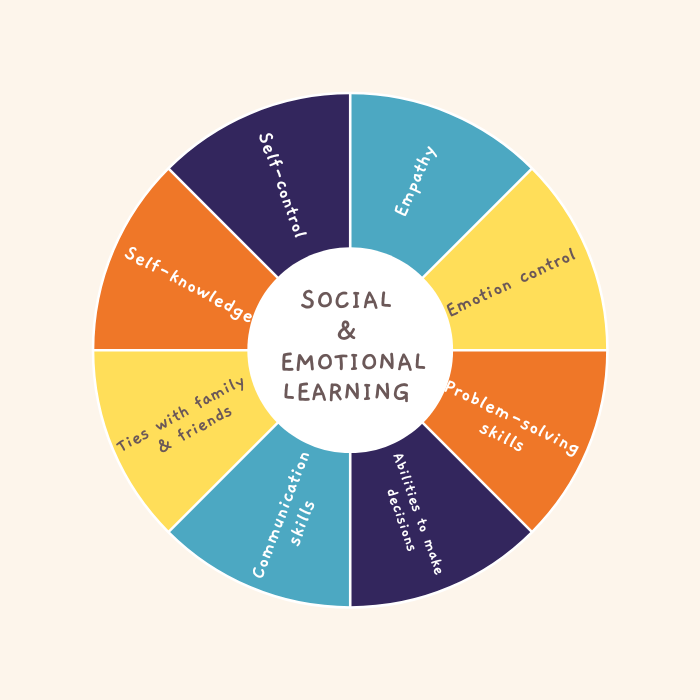Unlock Kids' Potential with Social Emotional Learning
A concept in education known as social and emotional learning (SEL) aids children in developing skills outside of arithmetic, reading, and other key academic subjects. SEL teaches young people how to recognize their emotions, comprehend and interact with others, form trusting bonds with others, and make morally sound judgments.
A collection of life skills that kids need to understand themselves and interact with others are the main focus of SOCIAL EMOTIONAL LEARNING. For instance, SOCIAL EMOTIONAL LEARNING instructs children on how to:
- Empathy
- Emotion control
- Problem-solving skills
- Abilities to make decisions
- Communication skills
- Ties with family and friends
- Self-knowledge
- Self-control
Children can learn more about themselves and the people around them through SEL. They can learn the abilities and information necessary to comprehend their feelings, form their identities, and establish goals.
Researchers carried out one of the largest and most thorough reviews of SOCIAL EMOTIONAL LEARNING in a significant 2011 study. They examined 213 research with more than 270,000 students and discovered, among other things, that taking part in SEL programs enhances kids’ academic achievement. The effects on kids and school communities are likewise long-lasting.

What is the Emotional Quotient, often Known as Emotional Intelligence?
The four main components of emotional intelligence are as follows.
- Self-awareness.
High self-aware individuals are conscious of their own feelings. They are aware of how their feelings influence their intentions and behavior.
- social consciousness
High social awareness individuals are very sympathetic. They are aware of the wants, feelings, and worries of others. They are adept at detecting social dynamics and signs.
- Self-management.
The capacity for impulse and behavior control is known as self-management. High self-management abilities also make people excellent at keeping their word and adjusting to change.
- relationship management.
One of the fundamental components of emotional intelligence is the ability to build and sustain meaningful relationships with people. Communication, conflict resolution, and teamwork are all qualities that people with great relationship management skills excel at.
Every aspect of life benefits from having emotional intelligence. Children gain from having the resources and instruction necessary to improve their EQ in a variety of ways.
A few Further Advantages of SEL are Improvements in:
- Relationships between home and school
- Empathy
- Self-esteem
- Self-awareness
- Communication skills
- Positive thinking patterns
- Problem-solving
- Stress response
- Mood
- Motivation
Why do we Require SEL now?
Life around the world has changed as a result of the COVID-19 outbreak. Children have experienced some of the biggest upheavals, even though we have all experienced interruptions in our everyday lives and routines.
During the pandemic, remote learning made it possible to attend class. Children with certain educational and learning preferences benefited in some ways from remote learning. However, this disturbance was extremely challenging for many other school-aged children and teenagers.
The epidemic affected more than simply the transition to a remote school day and the lack of classroom instruction.
Schools offer a wide range of extracurricular community programs. Children, for instance, were lacking the social structure that comes with attending school. There just weren’t any opportunities for daily peer contact, athletics, the arts, field excursions, school dances, graduations, or other events.
The importance of SEL programs will increase once children return to school. Children have experienced a difficult few years. Many will require special assistance. The best way to offer that help is through SEL programs.
Children who are struggling to cope with the tremendous stress and emotional effects of COVID-19 can benefit from SEL programs that can help them readjust to school life.
How Social Emotional Learning may Benefit Kids?
SEL can be applied in various contexts. Some educators decide to use it in the course of the academic year in their classes. There are ways to implement SEL on a monthly, weekly, or even daily basis.
For instance, one important aspect of SEL is assisting children in recognizing the emotion they are experiencing at the time. Teachers might ask students to make a brief daily assessment of their own feelings using age-appropriate tools and journaling prompts.
SEL activities that require more time include:
- writing exercises regarding concerns, objectives, and issues
- reading and debating passages with various viewpoints
- empathetically as a class
- theoretical problem-solving activities
- teamwork activities
To Sum UP
SEL has the potential to be an effective tool for teaching young people practical social skills and emotional intelligence. These abilities can enhance children’s academic performance and interpersonal interactions. They can raise their self-esteem as well.
Although SEL and emotional intelligence have always been crucial, they will become even more crucial once students return to the classroom following COVID-19.
Children of all ages have experienced mental health issues as a result of the epidemic, and schools can help their pupils adjust by teaching them the skills found in SEL programs.




